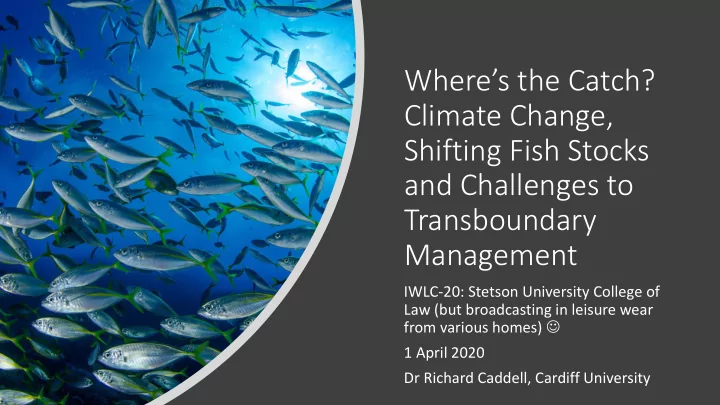

Where’s the Catch? Climate Change, Shifting Fish Stocks and Challenges to Transboundary Management IWLC-20: Stetson University College of Law (but broadcasting in leisure wear from various homes) ☺ 1 April 2020 Dr Richard Caddell, Cardiff University
• Current and projected trends in fish and fish stocks • How might we deal with climate-induced stock movements? • RFMO readiness • New fisheries • Collaborative arrangements • Reinterpreting current approaches • Prospective compensation Outline mechanisms • Tentative conclusions
• Climate change prompting Polar shifts in fish stocks • Perfect storm of depleted stocks, overfishing and shifting stocks • Major winners – northerly jurisdictions • Major losers – tropical regions: developing countries and limited alternative food sources • Scope for legal and physical conflict: e.g. mackerel conflict (WTO) Winners and losers • Jurisdictional difficulties
Projected trends Pinsky, Reygondeau, Caddell, Palacios- Abrantes, Spijkers & Cheung, ‘Preparing Ocean Governance for Species on the Move (2018) Science 360 (6394) 1189
• EEZ: LOSC Article 56(1) – states have sovereign rights over marine living resources • Article 61: states must prevent over-exploitation and maintain stocks at MSY • Article 62: states must promote optimal utilisation and set total allowable catch • Article 63: states shall cooperate to regulate shared stocks – leads to UNFSA • High seas: Article 87 (HS freedom); Articles 117-119 – duty to cooperate for high seas activities: International framework for interdependence of stocks and need to meet MSY fisheries • RFMOs the chosen vehicle to regulate stocks
• Regulatory restrictions: species, mandate, jurisdiction • Practical restrictions: scientific and material capacity; distinguishing CC from other changes • Few pertinent CMMs on climate change and/or associated effects • Marginalised in performance reviews • Marginalised in UNFSA RRC • Limited to ‘further research’ commitments RFMOs and climate change
• Fishing effort increasingly displaced to different areas, depths and species; possibly different fishing gear • Presents a challenge to international fisheries law, which is essentially based on predictability of fishing patterns and stocks • Accretion of practice and standards since 1989: can now identify clarity in intended processes • UN Fish Stocks Agreement 1995, Article 6(6) Establishing new fisheries • Practice of particular RFMOs – notably CCAMLR
Article 6(6): “For new or exploratory fisheries, States shall adopt as soon as possible cautious conservation and management measures , including, inter alia, catch limits and effort limits. Such measures shall remain in force until there are sufficient data to allow Fish Stocks assessment of the impact of the fisheries on the long-term sustainability of the Agreement stocks, whereupon conservation and management measures based on that assessment shall be implemented. The latter measures shall, if appropriate , allow for the gradual development of the fisheries.”
New fisheries and CCAMLR • Data collection challenges • Uneven state of knowledge across EFs • Increased ‘blurring’ of categories of research fishing (EFs Data-Poor EFs, closed areas, newly exposed marine areas) • Transition to managed status – procedures and criteria • Ross Sea fisheries: prospective transition to commercial management? • Expansion of CCAMLR practices into post- UNFSA RFMOs (SPRFMO, NPFC)
• Growing concerns over prospective Arctic fishing • CAOF Agreement 2018 (A5+5) • 16-year moratorium on unregulated commercial fishing • Regime for exploratory fishing • Potential new RFMO for these waters Arctic fisheries – building in precaution?
• First draft of Bill published October 2018 – widespread criticism of framework nature, lack of binding commitments and discretionary processes • Casualty of prorogation in 2019 and did not complete legislative passage • Key amendments made in interim period • Bill revised and reintroduced to Parliament 29 January 2020 • Second reading 11 February Climate change and evolving • Committee stage 2 March onwards (currently Corona- fisheries legislation ed)
• European Union (Withdrawal Act) 2020 – UK not bound by CFP regulations after Implementation Period ends on 31 December 2020 • Series of 8 core objectives: sustainability, precautionary, ecosystem, scientific evidence, bycatch (replaced discards), equal access, Promoting national benefit and climate change (latter two new additions) climate change • Climate change objective – 2 pronged approach in new law • ‘Adverse effect of fish and aquaculture activities on climate change is minimised’ • ‘Fish and aquaculture activities adapt to climate change’ • Vague and open-ended – no guidance in Explanatory Notes • Linkages with Environment Bill unclear
• CCAMLR and CCSBT negotiations 2005-2015 • 2015 Agreement on data exchange • Tuna fishing in CCAMLR area classed as exploratory • CCAMLR and SPRFMO • Shared Management: NAFO and NEAFC (redfish quota) • National examples Cooperative management
• Concept of ‘real interest’ in UNFSA • Practices towards new entrants • Should we chase fishing histories rather than fishing footprints? • NB – little incentive to change status quo; vicious circle of exclusion, even by states losing fish • Little tradition of ITQs and other flexible mechanisms Rethinking access rights?
• Fisheries law – somewhat fault-based • Examples of remediating excessive catches (Australia and New Zealand orange roughy catches) • Loss of fishing entitlements • Bilateral management – focus on collaborative action (albeit after conflict) • Warsaw International Mechanism for Loss and Damage associated with Climate Change Potential bases for • Problems: still nascent, little consideration of ocean resources, political compensation complexities of fisheries
• Fisheries dynamics are changing rapidly, with scope for conflict, governance gaps and inequity • International fisheries infrastructure is largely unprepared • Some far-sighted provisions provide a basis for action, albeit on a limited level • Increasing cooperation likely and necessary • Climate change should be a higher priority for RFMOs • Fisheries politics unlikely to ‘level up’ the playing field Conclusions • An opportunity to rethink fisheries regulation?
Thank you!! Stay safe everybody!!!
Recommend
More recommend